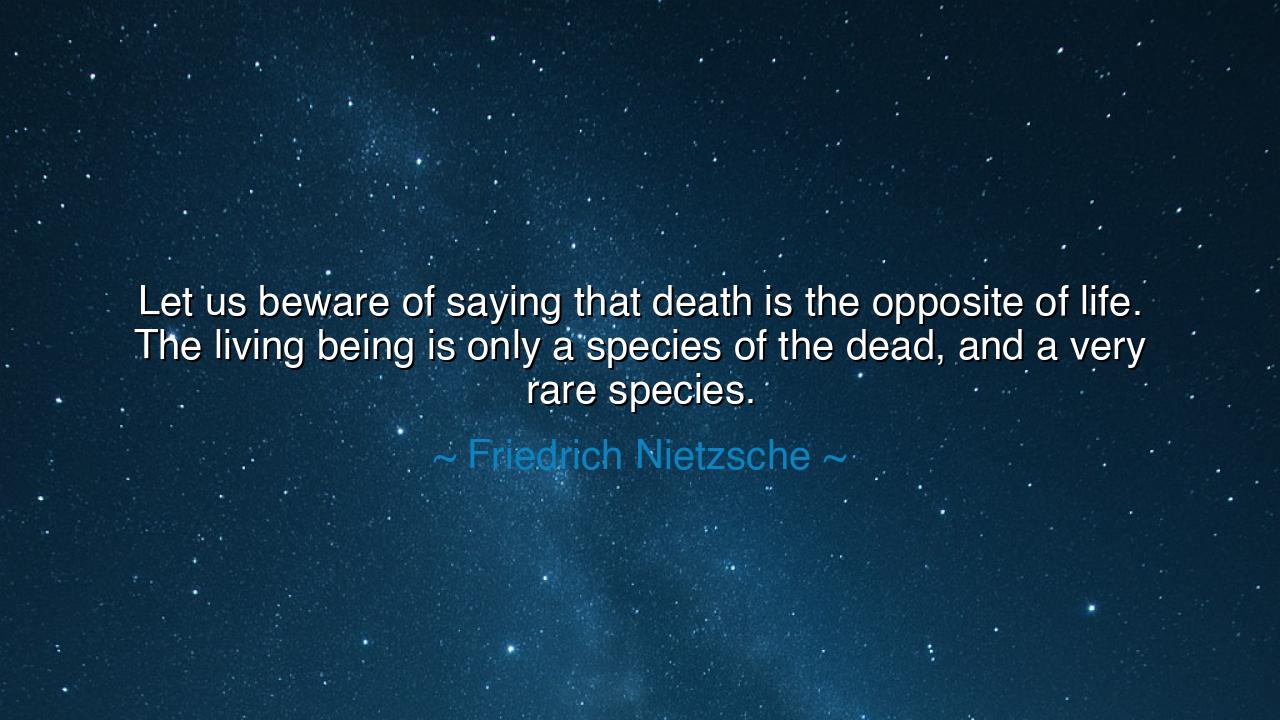
Let us beware of saying that death is the opposite of life. The
Let us beware of saying that death is the opposite of life. The living being is only a species of the dead, and a very rare species.






“Let us beware of saying that death is the opposite of life. The living being is only a species of the dead, and a very rare species.” — so wrote Friedrich Nietzsche, the philosopher who walked along the edges of existence and returned bearing the fire of truth. These words are not cold speculation; they are a summons to see the world as it truly is — a world where life and death are not enemies, but dancers in the same eternal rhythm. Nietzsche, whose thought sought always to destroy illusions so that life might shine brighter, reminds us here that to call death the “opposite” of life is to misunderstand both. Life is not the negation of death; it is its fleeting expression, its luminous form — a spark that flares briefly within the great stillness of eternity.
The origin of this idea lies deep within Nietzsche’s philosophy of becoming. To him, existence was not a battle between two opposing forces — good and evil, life and death, spirit and flesh — but a continuous transformation. Death, in his view, is not an end but a return: a dissolution into the greater whole from which all things arise. The living are not separate from the dead; they are the rare manifestation of death’s infinite stillness. Life is death made visible, given movement and voice. The body that breathes and dreams is built from the matter of those who came before — the dust of ancestors, the atoms of fallen stars. Thus, the living being is not death’s rival, but its offspring, its most delicate and improbable child.
To the ancients, this vision was not foreign. The Stoics believed that every living thing was born from the same substance, and that at death it returned to the cosmic fire — transformed, not lost. The Egyptians, too, saw life as a temporary sojourn in the cycle of death and rebirth, not a struggle against it. Even Heraclitus, long before Nietzsche, declared that “life and death are one, as the river and the sea are one.” Nietzsche’s genius was to revive this ancient wisdom for the modern soul, which had forgotten how to see itself as part of the eternal flow. He warned us to “beware” — to guard against the arrogance of thinking that life stands above death, that we, the living, are somehow apart from the endless continuum that binds all things.
In this light, death ceases to be a monster and becomes a mirror. To fear it is to fear our own nature, for within every heartbeat there is the shadow of stillness; within every breath, the whisper of silence. Nietzsche calls the living a “rare species” of the dead because life itself is an anomaly, a brief flowering of consciousness amid vast and timeless slumber. The universe has known death far longer than it has known life. For billions of years, the stars burned in solitude before even the smallest creature stirred. We are not the rulers of existence, but its most delicate flicker — a rare and fragile light trembling against the great dark.
Consider the story of the Buddha, who as a young prince was shielded from all suffering until the day he encountered sickness, aging, and death. In that moment, he realized that life could not be understood apart from its end. This realization did not drive him to despair but to enlightenment. By accepting death as part of life’s nature, he found peace, compassion, and freedom. Nietzsche’s words carry a similar power — not to sadden, but to awaken. To see death not as the destroyer of meaning, but as the very thing that gives life its urgency and depth.
For if all were immortal, nothing would matter. Beauty would lose its poignancy, love its tenderness, courage its glory. It is precisely because life is rare — because it flickers so briefly — that it becomes precious. Nietzsche, the eternal challenger of complacency, would have us live not in denial of death, but in defiance of its indifference. To live fully, one must face death and still choose to create, to love, to dance. In this defiance there is no despair, only affirmation — the cry of the living against the vastness of silence: “I am here, and I will burn brightly.”
Thus, my child, the lesson is this: do not fear death, and do not call it the enemy of life. It is the soil from which life grows, the night that gives meaning to the day. Live, therefore, with the knowledge of your mortality not as a burden, but as a gift. Let it make your choices sharper, your love deeper, your gratitude endless. Remember always that you are a rare species of the dead, entrusted for a brief moment with the miracle of breath and thought. Do not waste it.
For as Friedrich Nietzsche reminds us, the living and the dead are one — two faces of the same eternal being. To live truly is to stand in awe of that mystery, to embrace the fleeting fire of existence with courage and wonder. And when the flame fades, it returns not to nothingness, but to the infinite — to the vast and ancient stillness from which all stories begin and end.






AAdministratorAdministrator
Welcome, honored guests. Please leave a comment, we will respond soon